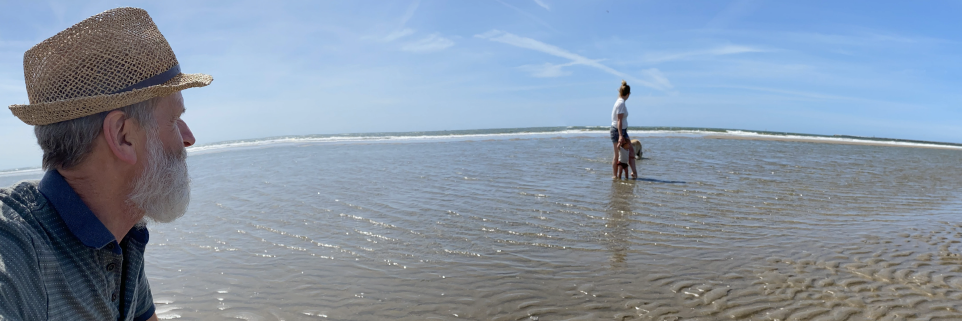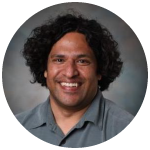
Insights from Stanford Professor Nilam Ram on the Shifting Perceptions of Old Age

Nilàm Ram, Professor of Communication and of Psychology, Stanford University
Stanford psychology and communication professor Nilàm Ram, a co-director of the Stanford Center on Longevity, is part of a team that asked more than 14,000 German adults born between 1911 and 1974 when old age begins – “At what age would you describe someone as old?”. The study, published in Psychology and Aging, found that over a period of 25 years, people’s definition of when old age begins got later and later. The findings suggest that there is a historical trend toward a postponement of the perceived onset of old age, although the authors note that the trend may be decelerating among younger people. The team also found that women perceive old age as starting later, and gender differences in perceived onset of old age have widened over historical time.
SCL recently sat down with Dr. Ram to discuss the longevity implications of the study, “Postponing Old Age: Evidence for Historical Change Toward a Later Perceived Onset of Old Age.” The interview has been edited for length and clarity.
SCL: Can you describe your findings?
Ram: The general finding is that over historical time people – on average – have been shifting the idea of when old age begins further out, so that people perceive that it now begins at a later age than in previous decades. It’s moving at about three years per two decades or so. Another finding is that – within a person – people are shifting the onset of old age further out, about one year for every four or five years of their own aging. Also, in general, women are reporting the onset of old age to be about two years later than men are. And that difference seems to be widening over the decades.
SCL: Why do you think these shifts in perception are happening? Do they reflect something about what people are experiencing in the world around them?
Ram: I think that’s it exactly. People’s perceptions of their personal circumstances and social environments are influencing how they feel about themselves and about their peers who are also aging. A lot of things have been happening over the last decades. There have been a lot of technological advancements in health, and people are generally getting larger amounts of education. All of this is influencing how people feel about their ability to deal with age-related cognitive and physical declines. When we feel more prepared for all of that, then it doesn’t seem as scary. A negative implication is that people are carrying old stereotypes around old age being characterized by decline. If I perceive that old age is a space where people are experiencing large amounts of cognitive and physical decline, then it’s in my best interest to shift that off further and further.
SCL: Maybe old age really does begin later for people. When I look at the world around me, people in their sixties seem significantly younger than my grandparents did in their sixties.
Ram: Yes. And what makes them seem younger? They’re more physically active, they’re more socially engaged, and they’re more cognitively engaged than we would have seen half a century ago. So we say, “old age must be beyond that.” As a society we generally have a perception that old age is when the decline begins.
SCL: We’re not old if we’re not declining.
Ram: Right. That’s the idea.
SCL: Why are women pushing their idea of old age so much later? Do you think it’s because we live longer?
Ram: That’s our working hypothesis. Women have, on average, a life expectancy that is longer, and women are remaining in better health than men are. So that might be why women perceive the onset of old age as occurring later.
SCL: Can you talk a little bit about how this connects to SCL’s work around longevity? Why does this matter?
Ram: My perception of when old age begins influences my behavior now in terms of how I’m preparing for later years, or how I’m constructing ideas about how long I will stay in the workforce, or how I will engage with family members and friends, et cetera. As the onset of old age gets pushed later, we need to reconstruct society in a way that allows people to do the things they would like to do before they get old. We need to change the social structures in ways that would facilitate elders’ achieving their goals.
The WHO (World Health Organization) has indicated that we need to put efforts into decreasing aging stereotypes because older adults have lots to offer all around the world. They’ve made that a priority indicator of how societies are doing. That suggests that we need to pay attention to how a society perceives when old age begins.
SCL: In that context, it would be interesting to understand what it is that people mean when they describe the onset of old age, because people are clearly not seeing old age as chronological. They’re associating it with some kind of decline.
Ram: Maybe it’s a good thing that the idea of old age is getting decoupled from chronological age. Even if we can’t change the sense of old age as being negative (which we’re also trying to do by noting that old age has a bunch of positives as well), at least it’s being decoupled from chronological age.
There is a negative stereotype associated with old age. And our evidence in and of itself doesn’t say that stereotype is changing, only that the stereotype is moving further out (in terms of age). We need to do additional work on how we might change the stereotype.
Even under the assumption that old age is characterized by decline, this shifting of old age to a later onset suggests that people are interested in doing more things and being more active. People would like to contribute. How do we provide opportunities for them to contribute to back to society? We see evidence that people who are more engaged are shifting the old age off further. So how do we keep people in that engaged mode, contributing to society in productive ways? We should be actively engaging seventy-, eighty- and even ninety-year-olds.
SCL: Any ideas about how we can support a more positive view of old age?
Ram: One other thing which I am struggling with is, what are the policy implications of this kind of shift. It’s not clear to me what we would tell policy makers to do in order to create a shift in better perception of old age. I think it’s an open question. We’re using historical time as a proxy for all of the technological advances that have facilitated extension of life expectancy. One implication is to continue the policies that help life expectancy or health span increase. The evidence shows that that’s helping.
SCL: Can you talk about the impact of Covid? I have friends in their sixties who say they felt dropped-kicked into old age because they were immediately lumped into a vulnerable population. And these are people who might not have thought they were old for another decade or two. Is that something to explore?
Ram: It’s certainly something to pursue down the road because covid did provide a way in which everything about the world suddenly shrank. No one was able to do as many things as they were doing before, to be as active in the same way, or to be as engaged with others.
Laura Carstensen’s work suggests that older adults actually did better than the younger adults in terms of being able to cope with those massive changes (during the pandemic shutdown). Certainly if you’ve been through World War II, then this was not as big a deal as it was for somebody who hadn’t been through an experience like that. In parallel, covid probably activated health concerns, and that activation seems to be a manifestation of feeling old.
SCL: On another topic. You found a distinction between experiences of old age in East and West Germany. Why? Is that regional distinction likely to pop up elsewhere?
Ram: The data show differences in average overall level of function and life satisfaction between former East and West Germany, but we don’t see that the aging process itself is shifting very much. In other words, the rate of physical and cognitive decline in former East Germany is, on average, the same as it is in former West Germany. Age-related decline of people living in different places proceeds from different levels, but they’re declining at the same rate.
That’s the general pattern we see everywhere. And that appears to be related to resources. In East Germany there were generally fewer resources in most domains, although in some domains there were better resources in East Germany than in West. The provision of childcare was better in East Germany. But overall the access to food, healthcare, and to monetary resources generally was lower in East Germany than in West Germany.
SCL: Could you translate that to the United States?
Ram: We would expect that people who live in lower resourced areas, in counties that have lower GDP, are likely going to have earlier onset of perceived age than people who live in rich counties.
SCL: That’s because they actually are experiencing declines earlier?
Ram: And feeling like they don’t have the resources to be able to cope with those declines. I may experience the declines, but if I feel as though my environment has the capability to support me, then I’m less likely to perceive that I’m at risk as much as if I’m in an environment that is not going to support me.
SCL: Where do you go next? What do you want to research?
Ram: I’m becoming quite curious about what are the causal things that are actually driving the changes. We’ve simply used historical time and chronological age as proxies for lots of processes that are happening in the background, such as technological advancements, changes in the educational system, et cetera. And we haven’t parsed out which exactly of all the many ways that society is changing is actually the one that is driving these shifts. Getting a better handle on what the causes are will lead us toward policy action. How can we help create policies that create a world that’s closer towards what we would like it to be? We’ve started having some conversations about how we might identify natural experiments in the data, places where there were policy changes or when people moved from one regional location to another regional location and obtained access to different sets of resources. Parsing out some of those natural experiments will help us gain traction on what the causes of change are and how we might collectively modify them to make the world better.
Further reading:
Perception of when old age starts has increased over time, shows study –
The Guardian (UK)
